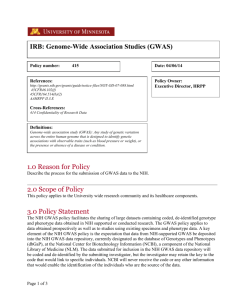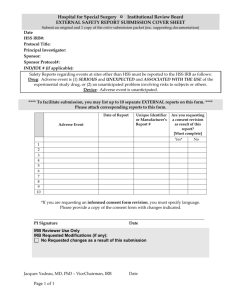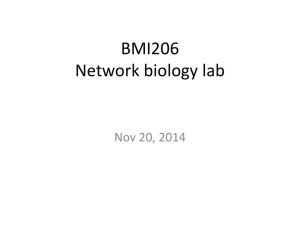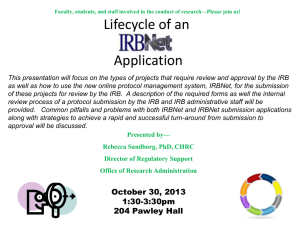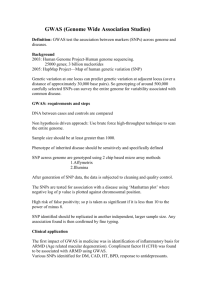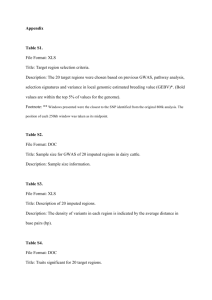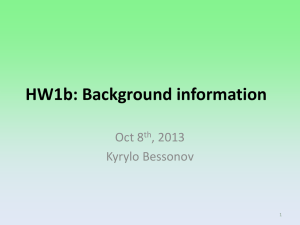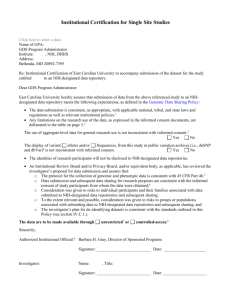Guidance Document - University of Pennsylvania
advertisement
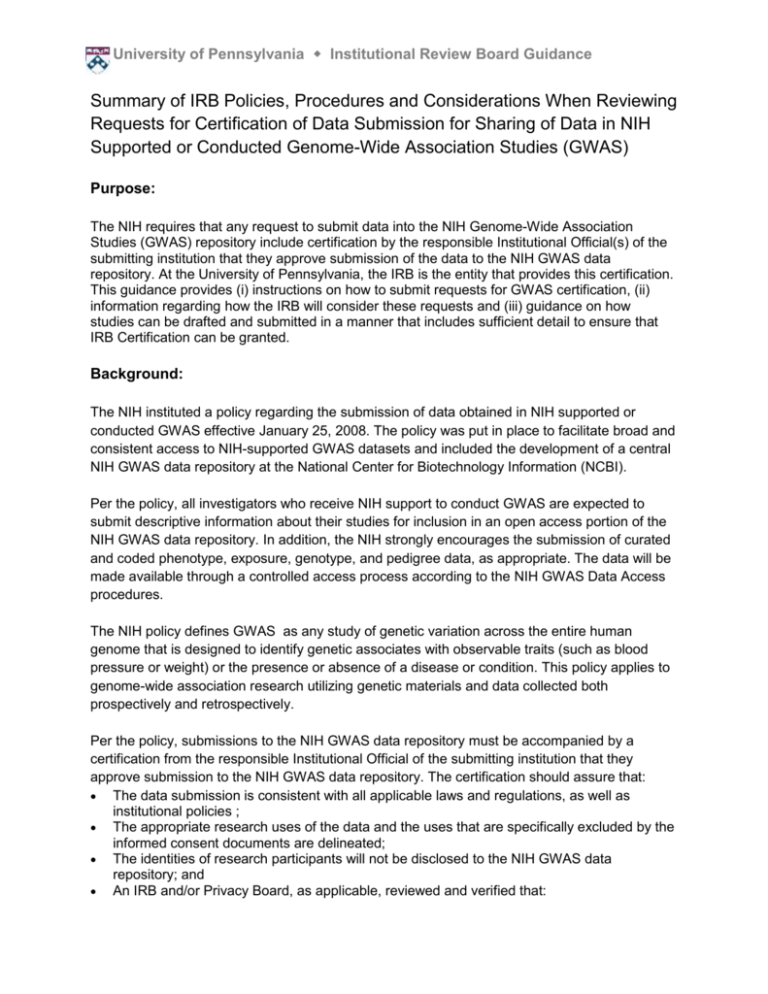
University of Pennsylvania Institutional Review Board Guidance Summary of IRB Policies, Procedures and Considerations When Reviewing Requests for Certification of Data Submission for Sharing of Data in NIH Supported or Conducted Genome-Wide Association Studies (GWAS) Purpose: The NIH requires that any request to submit data into the NIH Genome-Wide Association Studies (GWAS) repository include certification by the responsible Institutional Official(s) of the submitting institution that they approve submission of the data to the NIH GWAS data repository. At the University of Pennsylvania, the IRB is the entity that provides this certification. This guidance provides (i) instructions on how to submit requests for GWAS certification, (ii) information regarding how the IRB will consider these requests and (iii) guidance on how studies can be drafted and submitted in a manner that includes sufficient detail to ensure that IRB Certification can be granted. Background: The NIH instituted a policy regarding the submission of data obtained in NIH supported or conducted GWAS effective January 25, 2008. The policy was put in place to facilitate broad and consistent access to NIH-supported GWAS datasets and included the development of a central NIH GWAS data repository at the National Center for Biotechnology Information (NCBI). Per the policy, all investigators who receive NIH support to conduct GWAS are expected to submit descriptive information about their studies for inclusion in an open access portion of the NIH GWAS data repository. In addition, the NIH strongly encourages the submission of curated and coded phenotype, exposure, genotype, and pedigree data, as appropriate. The data will be made available through a controlled access process according to the NIH GWAS Data Access procedures. The NIH policy defines GWAS as any study of genetic variation across the entire human genome that is designed to identify genetic associates with observable traits (such as blood pressure or weight) or the presence or absence of a disease or condition. This policy applies to genome-wide association research utilizing genetic materials and data collected both prospectively and retrospectively. Per the policy, submissions to the NIH GWAS data repository must be accompanied by a certification from the responsible Institutional Official of the submitting institution that they approve submission to the NIH GWAS data repository. The certification should assure that: The data submission is consistent with all applicable laws and regulations, as well as institutional policies ; The appropriate research uses of the data and the uses that are specifically excluded by the informed consent documents are delineated; The identities of research participants will not be disclosed to the NIH GWAS data repository; and An IRB and/or Privacy Board, as applicable, reviewed and verified that: University of Pennsylvania Institutional Review Board Guidance o o o o The submission of data to the NIH GWAS data repository and subsequent sharing for research purposes are consistent with the informed consent of study participants from whom the data were obtained; The investigator’s plan for de-identifying datasets is consistent with the standards outlined above; It has considered the risks to individuals, their families, and groups or populations associated with data submitted to the NIH GWAS data repository; and The genotype and phenotype data to be submitted were collected in a manner consistent with 45 C.F.R. Part 46. How to Submit a Request for GWAS Submission Certification: The request for a GWAS submission certification letter should be sent to the IRB in a manner similar to submission of Protocol Modifications that qualify for expedited review. The paper or electronic modification form should be completed. The submission should also include a cover letter, a copy of the informed consent form and, if applicable, the HIPAA authorization form. The cover letter should serve as a summary of the request for GWAS Certification. It should clearly state the request for a certification letter approving submission to the NIH GWAS registry. The summary should also include justification for why the IRB can appropriately assure that the criteria for certification have been met for the specific study (criteria are listed in the above background section). Once received by the IRB, the submission will be processed in a manner similar to expedited modifications. An IRB Administrator will review the request and, if necessary, contact the study team to obtain additional information. The final decision will then be made by the IRB’s signatory official for GWAS Certification. If the IRB approves the request, the certification letter will be sent to the study team via email. If the IRB determines that certification cannot be given, the study team will receive, via email, written notice of the decision and the rationale for why submission was not approved. Points Considered by the IRB for all GWAS Submission Requests: After receiving the GWAS certification request, the IRB will conduct a review of the study records to confirm that the study has been conducted in accordance with federal and state regulations and institutional policies. The IRB will review the request summary, study protocol (if available) and protocol summary (or online application) to determine that submission to GWAS is consistent with applicable laws and regulations and that an appropriate plan to protect the identities of subjects and to de-identify the data is in place. In addition, the study will be reviewed to ensure that the submission to GWAS will not pose inappropriate risk to subjects, their families, and groups or populations associated with the data. Consideration will be given to whether a Certificate of Confidentiality has been obtained and if University of Pennsylvania Institutional Review Board Guidance not, if one is necessary prior to GWAS submission. For additional information on Certificates of Confidentiality, please visit the NIH Certificate Kiosk (http://grants2.nih.gov/grants/policy/coc/). There are numerous issues that determine the appropriateness of informed consent for submission of data. These issues are discussed below. Please note that the GWAS policy applies to data collected both prospectively and retrospectively and different considerations will be applied depending on the type of study. Points Considered by the IRB for studies initiated and conducted prior to implementation of the NIH GWAS registry policy: The IRB must determine whether the existing genetic materials and data were obtained in manner that is consistent with submission of data to the repository. Therefore, the manner in which subjects consented for research activities must have appropriately allowed for genetic research and analysis, future use of samples and data for genetic analysis, and the broad sharing of samples and data with investigators outside of the University of Pennsylvania. The IRB understands that there will be a great deal of variety in the consent forms used by researchers at Penn to obtain consent for collection and/use of specimens for genetic research. Below are some of the questions the IRB will consider when reviewing consent forms to determine if GWAS submission is appropriate: Does the consent form either allow or preclude: • genetic research or analysis? • future use and broad sharing of the participant’s coded phenotype and genotype data for research? • submission of the participant’s coded phenotype and genotype data to a government health research database for broad sharing to qualified investigators? Does the consent form have any restrictions, such as: • types of subsequent research using the participant’s phenotype and genotype data? • location of such research? • types of medical conditions or diseases studied? • duration of storage and use of phenotype and genotype data? • limitations on who can use the participant’s phenotype and genotype data (e.g. some consents may state that only non-commercial researchers can use the data)? If the IRB determines that submission to GWAS is appropriate, the IRB may delineate in the certification letter any uses of the data that are specifically excluded by the informed consent documents. If the IRB determines that the consent form is not adequate for certification, the investigator has the option, if feasible, to obtain explicit consent from the research participants for submission of their data to GWAS. If it is infeasible or inappropriate to obtain explicit consent the IRB will not University of Pennsylvania Institutional Review Board Guidance approve submission to GWAS and the decision will be conveyed in the manner previously described. Please note that per the NIH policy, the IRB cannot waive the criteria for informed consent for submission to the GWAS database. Points Considered by the IRB for studies initiated and conducted after the implementation of the NIH GWAS registry policy: All studies that anticipate submitting to GWAS and are ongoing or have not begun are expected to have appropriate de-identification plans and consent forms. Study protocols and protocol summaries (or online applications) should detail the expected disclosure to GWAS and the consent forms should clearly state that participants’ DNA will undergo genome-wide analysis and that genotypic and phenotypic data will be shared for research purposes through the NIH GWAS data repository. For studies that are currently ongoing that do not comply with this policy, modifications should be submitted to bring the study into agreement with the GWAS registry policy. If appropriate, the IRB may require that explicit consent be sought from all subjects previously consented. New studies that have not been submitted for IRB review should detail the anticipated GWAS submission. In addition, the consent form should detail the implications of broad sharing of genome wide data for subjects and their family members. References: A majority of the information provided in this guidance document was obtained from the sources listed below. Please review these documents for additional information on policies and procedures related to submission to the NIH GWAS registry. NIH Genome-Wide Association Studies Website: http://gwas.nih.gov Policy for Sharing of Data Obtain in NIH Supported or Conducted Genome-Wide Association Studies (GWAS): http://grants.nih.gov/grants/guide/notice-files/NOT-OD-07088.html NIH Points to Consider for IRBs and Institutions in their Review of Data Submission Plans for Institutional Certifications Under NIH’s Policy for Sharing of Data Obtained NIH Supported or Conducted Genome-Wide Association studies (GWAS): http://gwas.nih.gov/pdf/PTC_for_IRBs_and_Institutions_revised5-31-11.pdf University of Pennsylvania Institutional Review Board Standard Operating Policies and Guide to Daily Operations: http://www.upenn.edu/regulatoryaffairs/index.php?option=com_content&task=view&id=2 4&Itemid=8
